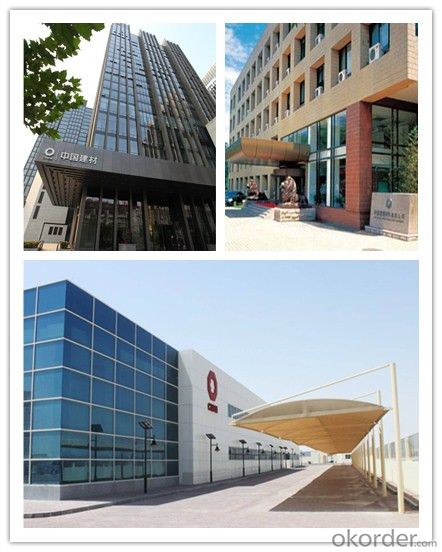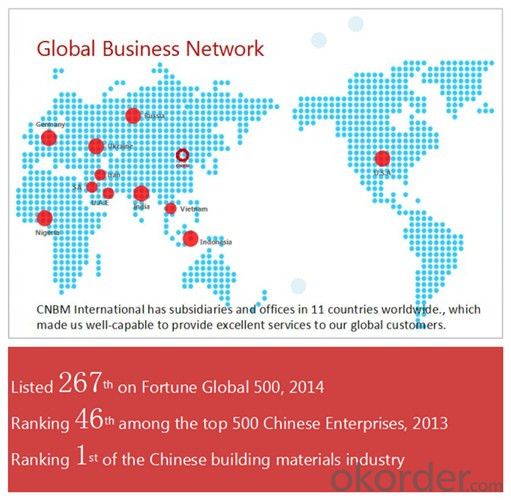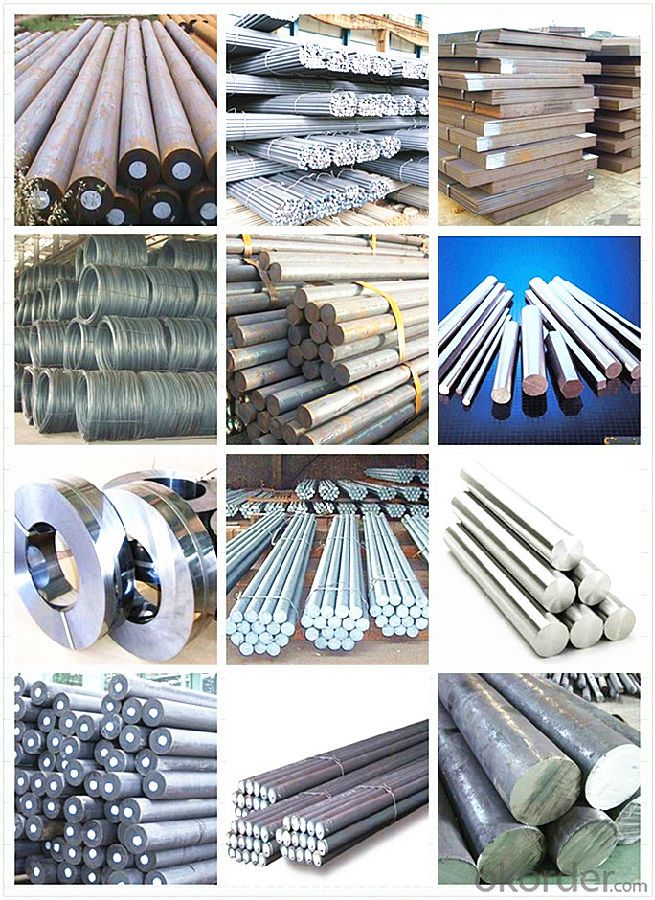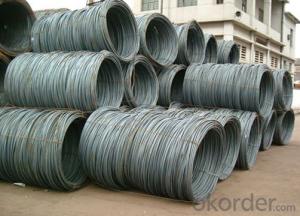Hot Rolled High Carbon Wire Rod With Different Material Grades
- Loading Port:
- Tianjin
- Payment Terms:
- TT OR LC
- Min Order Qty:
- 3 m.t.
- Supply Capability:
- 10000 m.t./month
OKorder Service Pledge
Quality Product, Order Online Tracking, Timely Delivery
OKorder Financial Service
Credit Rating, Credit Services, Credit Purchasing
You Might Also Like
Item specifice
Type:
Carbon Steel,Spring Steel,Bearing Steel,Gear Steel,Deformed Steel,Stainless Steel,Alloy Steel
Shape:
Steel Coil,Steel Sheet,Steel Wire Rod,Steel Flat Bar,Steel Square Bar,Steel Angle,Steel Round Bar,Steel Billets
Technique:
Hot Rolled,Cold Rolled,Cold Drawn,ERW,Forged,Saw,Extruded,EFW,Spring
Surface Treatment:
Galvanized,Coated,Copper Coated,Color Coated,Oiled,Dry,Chromed Passivation,Polished,Bright,Black,PVDF Coated
Certification:
ISO,SGS,BV,IBR,RoHS,CE,API,BSI,UL
Thickness:
5.5-20mm
Width:
5.5-20mm
Length:
coil
Outer Diameter:
5.5-20mm
Net Weight:
2m.t.
Packaging:
Seaworthy packaging
Hot Rolled High Carbon Wire Rod With Different Material Grades
Detailed Information of the Hot Rolled High Carbon Wire Rod
| Name | Hot Rolled High Carbon Wire Rod |
| Shape | Round Bar/Square Bar/Flat Bar/Plate/Wire |
| Standard | GB/ASTM/SAE/AISI/DIN/JIS/EN/BS |
| Surface Treatment: | Black/Peeling/Polished/Machined |
| Delivery Condition: | Hot Rolled or Forged/Peeled or Black Surface |
| Test | SGS/UT 100% Elements Testing |
| Certificate: | ISO/Mill Certificate |
| Service: | 24 hours online service / |
| more than 20 years trading and manufacture | |
| Quality Assurance: | the third party inspection, such as SGS, BV, TUV…etc. is acceptable |
| Packaging Details: | Seaworthy Packaging or as per customer's packing instruction |
Chemical Composition of the Hot Rolled High Carbon Wire Rod
| Grade | Dia(mm) | Chemical Composition % | |||||||
| C | Si | Mn | P | S | Ni | Cr | Cu | ||
| 35 | 5.5,6.5, 8,10 | 0.32-0.39 | 0.17-0.37 | 0.50-0.80 | ≤0.035 | ≤0.035 | ≤0.30 | ≤0.25 | ≤0.25 |
| 40 | 0.37-0.44 | 0.17-0.37 | 0.50-0.80 | ≤0.035 | ≤0.035 | ≤0.30 | ≤0.25 | ≤0.25 | |
| 45 | 0.42-0.50 | 0.17-0.37 | 0.50-0.80 | ≤0.035 | ≤0.035 | ≤0.30 | ≤0.25 | ≤0.25 | |
| 50 | 0.52-0.60 | 0.17-0.37 | 0.50-0.80 | ≤0.035 | ≤0.035 | ≤0.30 | ≤0.25 | ≤0.25 | |
| 60 | 0.57-0.65 | 0.17-0.37 | 0.50-0.80 | ≤0.035 | ≤0.035 | ≤0.30 | ≤0.25 | ≤0.25 | |
| 70 | 0.67-0.75 | 0.17-0.37 | 0.50-0.80 | ≤0.035 | ≤0.035 | ≤0.30 | ≤0.25 | ≤0.25 | |
| 80 | 0.77-0.85 | 0.17-0.37 | 0.50-0.80 | ≤0.035 | ≤0.035 | ≤0.30 | ≤0.25 | ≤0.25 | |
| 85 | 0.82-0.90 | ≤0.19 | ≤0.20 | ≤0.21 | ≤0.22 | ≤0.23 | ≤0.24 | ≤0.25 | |
Company Introduction the Hot Rolled High Carbon Wire Rod
CNBM International Corporation is the most import and export platform of CNBM group(China National Building Material Group Corporation) ,which is a state-owned enterprise, ranked in 270th of Fortune Global 500 in 2015.
With its advantages, CNBM International are mainly concentrate on Cement, Glass, Iron and Steel, Ceramics industries and devotes herself for supplying high quality series of refractories as well as technical consultancies and logistics solution.


| After-sale service | CNBM provides the services and support you need for every step of our cooperation. We’re the business partners you can trust; you can relax and get on with doing business. |
| For any problem, please kindly contact us at any your convenient time, we’ll reply you in our first priority within 24 hours | |
| Advantages | Industry experience over 20 years. |
| Shipment of goods -More than 70 countries worldwide. | |
| The most convenient transport and prompt delivery. | |
| Competitive price with best service. | |
| High technical production line with top quality products. | |
| High reputation based on best quality products. |
Packaging & Delivery the Hot Rolled High Carbon Wire Rod
| Packaging Detail | Sea worthy packing /as per customer's packing instruction |
| Delivery Detail | 15 ~ 40 days after receiving the deposit |
Products Show

FAQ:
| Are you a trader or manufacturer? | Manufacturer |
| What’s the MOQ? | 3 metric ton |
| What’s your delivery time? | 15-35 days after downpayment received |
| Do you Accept OEM service? | Yes |
| what’s your delivery terms? | FOB/CFR/CIF |
| What's the Payment Terms? | 30% as deposit,70% before shipment by T/T |
| Western Union acceptable for small amount. | |
| L/C acceptable for large amount. | |
| Scrow ,Paybal,Alipay are also ok | |
| Why choose us? | Chose happens because of quality, then price, We can give you both. |
| Additionally, we can also offer professional products inquiry, products knowledge train (for agents), smooth goods delivery, excellent customer solution proposals. | |
| What's your available port of Shipment? | Main Port, China |
| What’s your featured services? | Our service formula: good quality+ good price+ good service=customer's trust |
| Where are your Market? | Covering more than 160 countries in the world |
- Q:How does special steel contribute to the medical industry?
- Special steel contributes to the medical industry by providing essential materials for the manufacturing of medical devices and equipment. Its unique properties, such as high strength, corrosion resistance, and biocompatibility, make it suitable for various applications, including surgical instruments, implants, prosthetics, and MRI machines. The use of special steel ensures the durability, precision, and safety of medical tools, ultimately improving patient outcomes and advancing medical technologies.
- Q:Can special steel be used in the nuclear industry?
- Indeed, the nuclear industry finds special steel to be a valuable asset. This type of steel, also referred to as stainless steel, is commonly utilized in nuclear power plants due to its exceptional resistance to corrosion, impressive strength, and capability to endure high temperatures. Given the demanding conditions of nuclear reactors, which involve radiation exposure, high-pressure and high-temperature environments, as well as corrosive substances, the nuclear industry necessitates materials that can withstand such harsh circumstances. Special steel possesses properties that render it suitable for these conditions, including its corrosion resistance and ability to maintain mechanical properties at elevated temperatures. Furthermore, special steel plays a crucial role in the construction of nuclear fuel rods, storage containers, and other vital components. It is crucial to emphasize that the special steel employed in the nuclear industry is subject to rigorous quality control measures and testing in order to ensure its reliability and safety.
- Q:How does special steel contribute to the thermal conductivity of products?
- The unique composition and properties of special steel significantly enhance the thermal conductivity of products. By incorporating specific alloying elements like chromium, nickel, molybdenum, or vanadium, the thermal conductivity of special steel is improved. These alloying elements increase the free electron density within the steel, facilitating efficient heat transfer. The presence of alloying elements in special steel improves its lattice structure, enabling better heat transfer. The increased free electron density allows for quick and efficient movement of thermal energy through the material. Consequently, special steel effectively conducts heat from one area to another, making it suitable for applications requiring high thermal conductivity. Moreover, special steel undergoes advanced techniques like heat treatment, forging, or rolling, which further optimize its properties. These processes refine the microstructure, reducing impurities and enhancing thermal conductivity. As a result, the resulting steel product exhibits improved heat transfer capabilities and offers efficient thermal management. The remarkable thermal conductivity of special steel makes it highly sought after in various industries and applications. It finds extensive use in manufacturing heat exchangers, boilers, furnaces, and other thermal equipment where efficient heat transfer is crucial. Additionally, special steel is commonly employed in electrical appliances such as stovetops or induction cookers, where rapid and uniform heat distribution is necessary. To sum up, special steel enhances the thermal conductivity of products by utilizing specific alloying elements and advanced processing techniques. Its high thermal conductivity makes it invaluable in various industries, ensuring efficient heat management and optimal performance of thermal equipment and appliances.
- Q:Can special steel be used for making electrical components?
- Yes, special steel can be used for making electrical components. Special steel refers to a group of steels with specific properties and characteristics that make them suitable for various applications, including electrical components. These steels are often engineered to have high electrical conductivity, low electrical resistance, good magnetic properties, and excellent heat resistance. They are typically used in electrical engineering applications where high performance and reliability are required, such as in the manufacturing of transformers, motors, generators, and electrical transmission systems. Special steel can also provide resistance to corrosion and high temperatures, which further enhances its suitability for electrical component manufacturing.
- Q:What are the different mechanical defects in special steel?
- There are several mechanical defects that can occur in special steel, which can compromise its overall strength and performance. Some of the most common defects include: 1. Inclusions: Inclusions are foreign particles or impurities that are present in the steel. These can include oxides, sulfides, or other non-metallic materials. Inclusions can weaken the steel and reduce its ductility, making it more prone to cracking or failure. 2. Segregation: Segregation refers to the uneven distribution of alloying elements within the steel. This can lead to variations in hardness, strength, and other mechanical properties across the material. Segregation can create localized areas of weakness, increasing the likelihood of failure under stress. 3. Cracks: Cracks can occur in special steel due to a variety of factors, such as improper cooling, excessive heat, or high levels of stress. Cracks can significantly reduce the structural integrity of the steel and may propagate over time, leading to catastrophic failure. 4. Laminations: Laminations are thin layers or sheets of material that are formed during the manufacturing process. They can occur due to improper rolling or forging, or the presence of inclusions. Laminations can weaken the steel and lead to premature failure under load. 5. Decarburization: Decarburization is the loss of carbon from the surface of the steel, typically due to exposure to high temperatures or oxidation. This can result in a layer of softer, lower carbon steel on the surface, reducing the overall hardness and strength of the material. 6. Grain growth: Grain growth occurs when the individual crystals within the steel (grains) grow larger over time. This can happen due to high temperatures, prolonged exposure to stress, or improper heat treatment. Grain growth can reduce the strength and toughness of the steel, making it more prone to deformation or fracture. It is important to note that these mechanical defects can vary in severity and are often influenced by factors such as the manufacturing process, quality control measures, and the specific composition of the special steel. Regular inspection, testing, and adherence to proper handling and processing techniques are essential to minimize these defects and ensure the desired mechanical properties in special steel.
- Q:What are the main applications of special steel in the pharmaceutical industry?
- Special steel is widely used in the pharmaceutical industry for various applications. One of the main applications is in the manufacturing of pharmaceutical equipment and machinery, such as mixing tanks, reactors, and storage containers. Special steel is preferred for these applications due to its superior corrosion resistance, high strength, and durability, ensuring the safety and hygiene standards required in the pharmaceutical industry. Additionally, special steel is also used for the production of precision instruments and tools used in pharmaceutical research and development, ensuring accurate measurements and reliable results.
- Q:What are the properties of high-strength steel?
- High-strength steel has several key properties that make it desirable for various applications. It possesses exceptional strength, allowing it to withstand heavy loads and resist deformation under stress. It also exhibits excellent toughness, meaning it can absorb energy without fracturing. Additionally, high-strength steel typically offers high hardness, good wear resistance, and enhanced corrosion resistance. Its properties make it ideal for use in industries such as automotive, aerospace, construction, and manufacturing, where durability and reliability are crucial.
- Q:What are the emerging trends in special steel production?
- Some of the emerging trends in special steel production include the use of advanced technologies, such as additive manufacturing and automation, to enhance efficiency and precision in the production process. Additionally, there is a growing demand for eco-friendly and sustainable production methods, leading to the development of greener steelmaking processes. Furthermore, there is a focus on creating specialty steels with improved properties, such as higher strength, corrosion resistance, and heat resistance, to meet the evolving needs of various industries.
- Q:How is special steel manufactured?
- Special steel is manufactured through a process called steelmaking, which involves melting iron ore along with other alloying elements such as chromium, nickel, or molybdenum, to achieve the desired properties. The molten steel is then refined, cast into various shapes, and subjected to heat treatment to enhance its strength, hardness, and other mechanical properties.
- Q:What are the different joining methods for special steel?
- There are several different joining methods for special steel, including welding, brazing, soldering, and mechanical fastening. Each method has its own advantages and considerations depending on the specific requirements of the application. Welding is commonly used for joining thick sections of steel and offers high strength and durability. Brazing and soldering involve melting a filler material to bond the steel pieces together at lower temperatures, making them suitable for joining thin or delicate components. Mechanical fastening methods, such as bolts, nuts, and rivets, provide a non-permanent joining solution and are often used in applications that require disassembly or reassembly.
1. Manufacturer Overview |
|
|---|---|
| Location | |
| Year Established | |
| Annual Output Value | |
| Main Markets | |
| Company Certifications | |
2. Manufacturer Certificates |
|
|---|---|
| a) Certification Name | |
| Range | |
| Reference | |
| Validity Period | |
3. Manufacturer Capability |
|
|---|---|
| a)Trade Capacity | |
| Nearest Port | |
| Export Percentage | |
| No.of Employees in Trade Department | |
| Language Spoken: | |
| b)Factory Information | |
| Factory Size: | |
| No. of Production Lines | |
| Contract Manufacturing | |
| Product Price Range | |
Send your message to us
Hot Rolled High Carbon Wire Rod With Different Material Grades
- Loading Port:
- Tianjin
- Payment Terms:
- TT OR LC
- Min Order Qty:
- 3 m.t.
- Supply Capability:
- 10000 m.t./month
OKorder Service Pledge
Quality Product, Order Online Tracking, Timely Delivery
OKorder Financial Service
Credit Rating, Credit Services, Credit Purchasing
Similar products
New products
Hot products
Related keywords
































